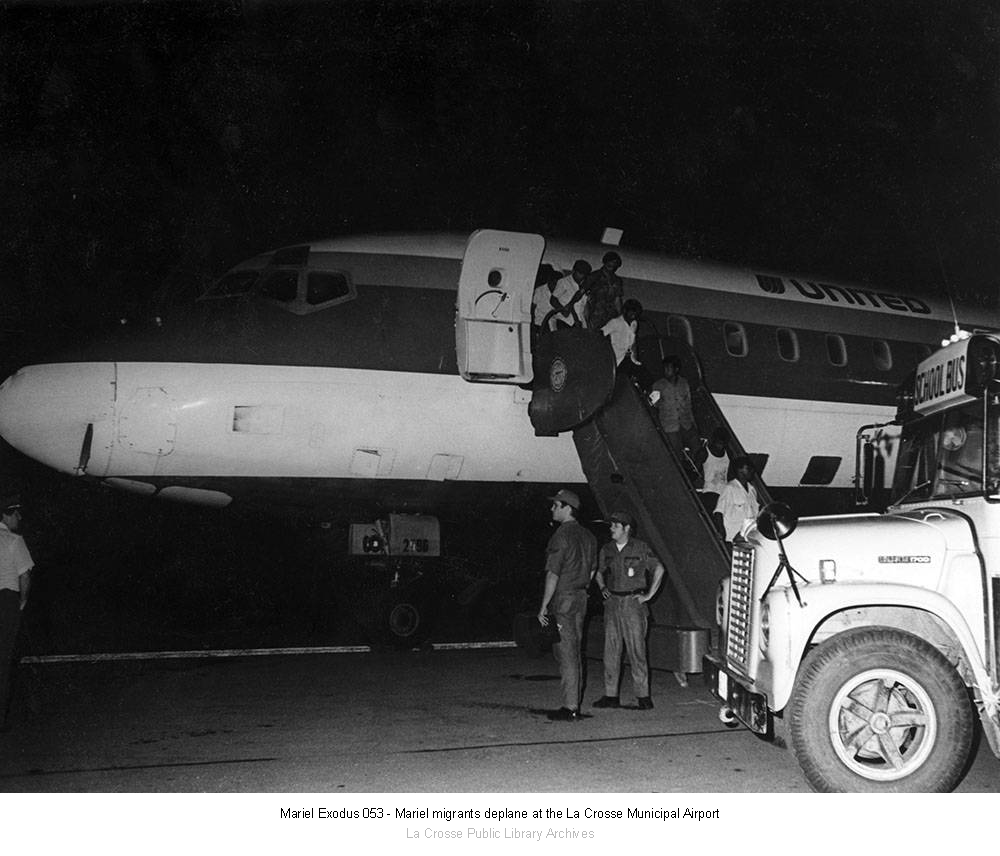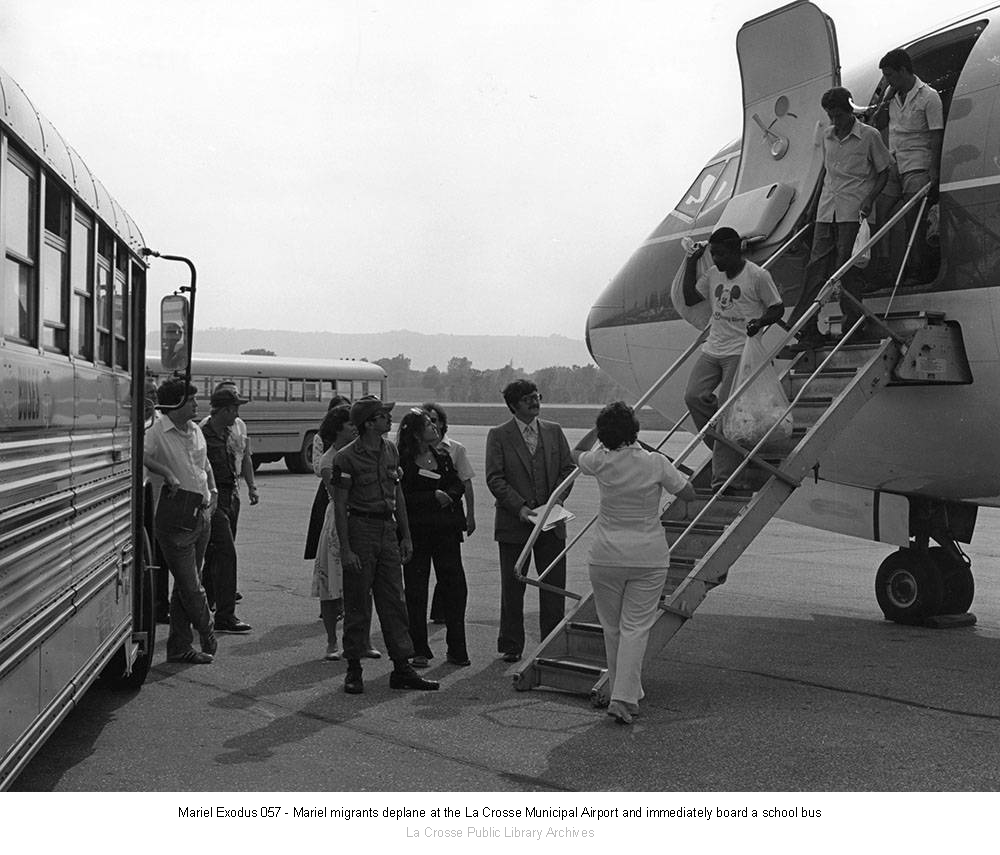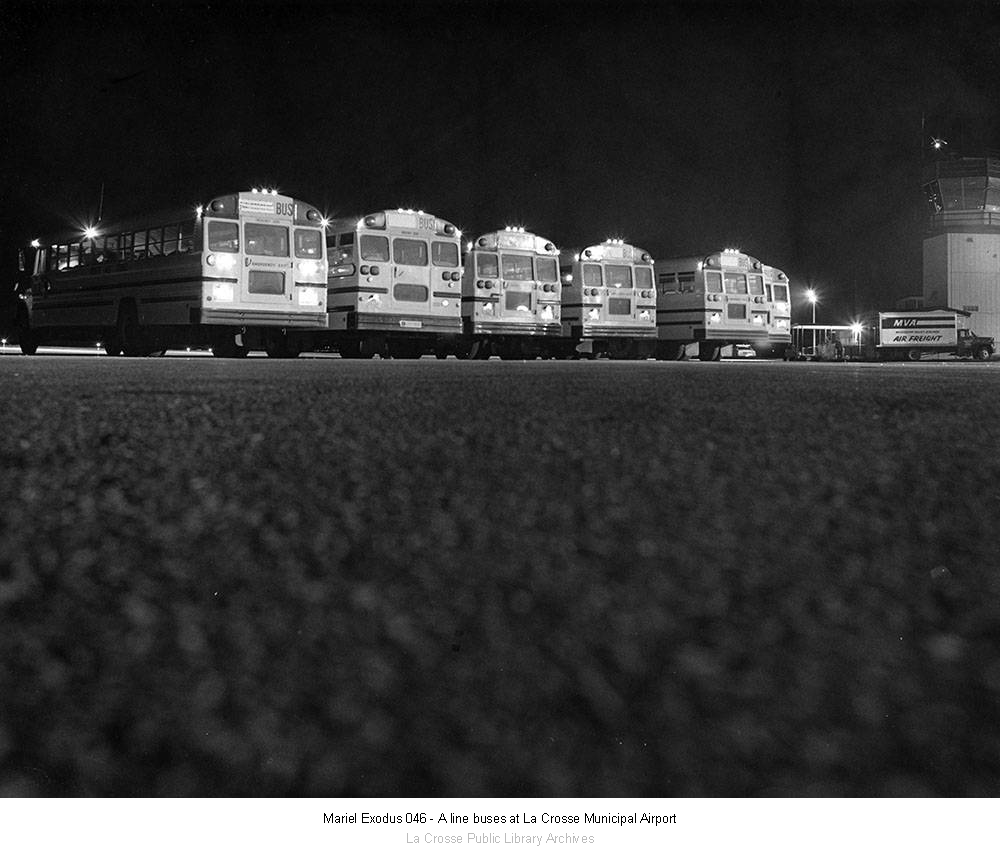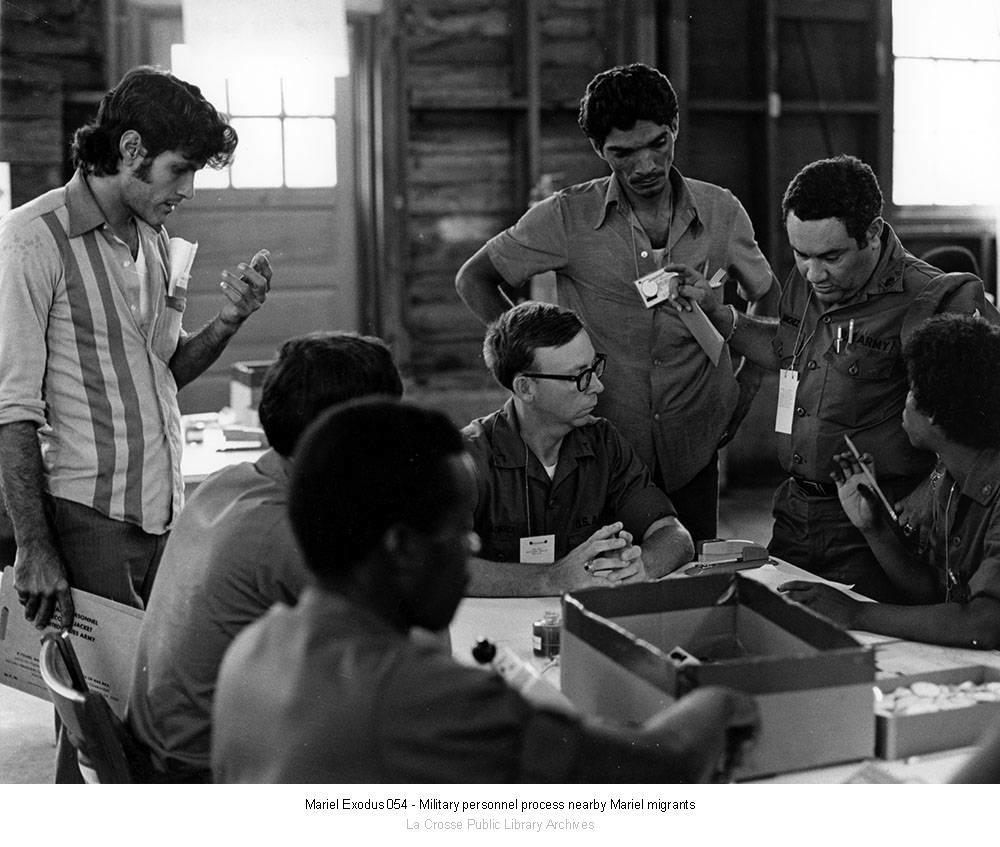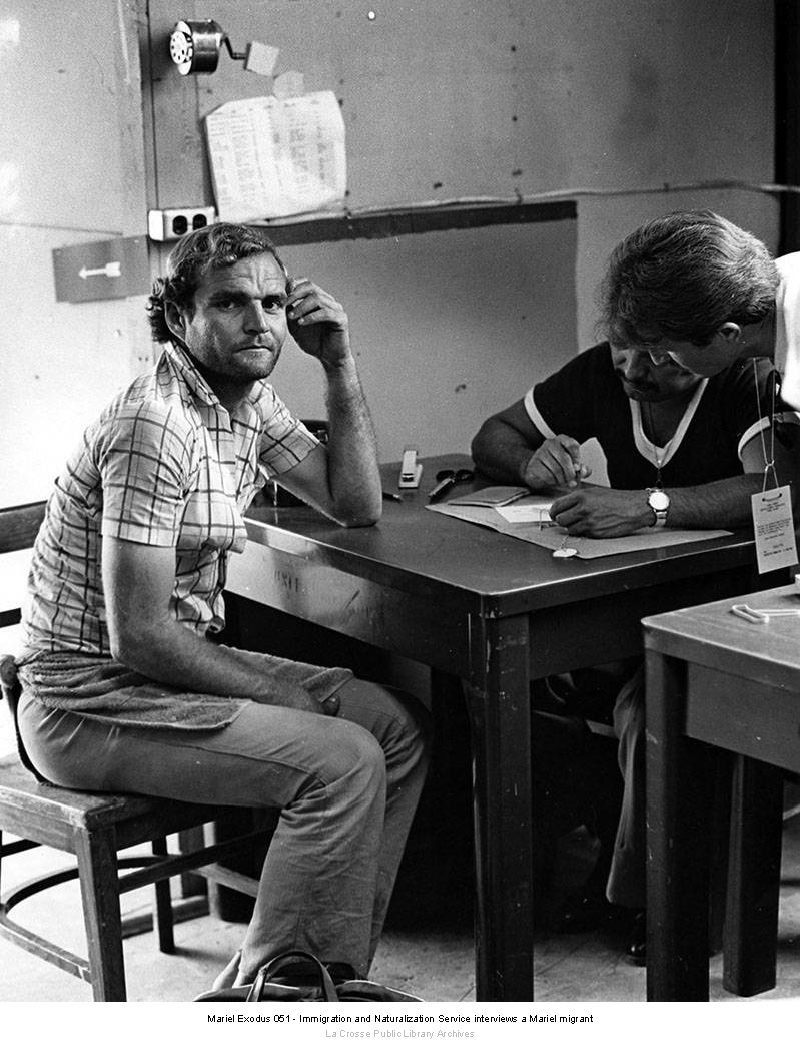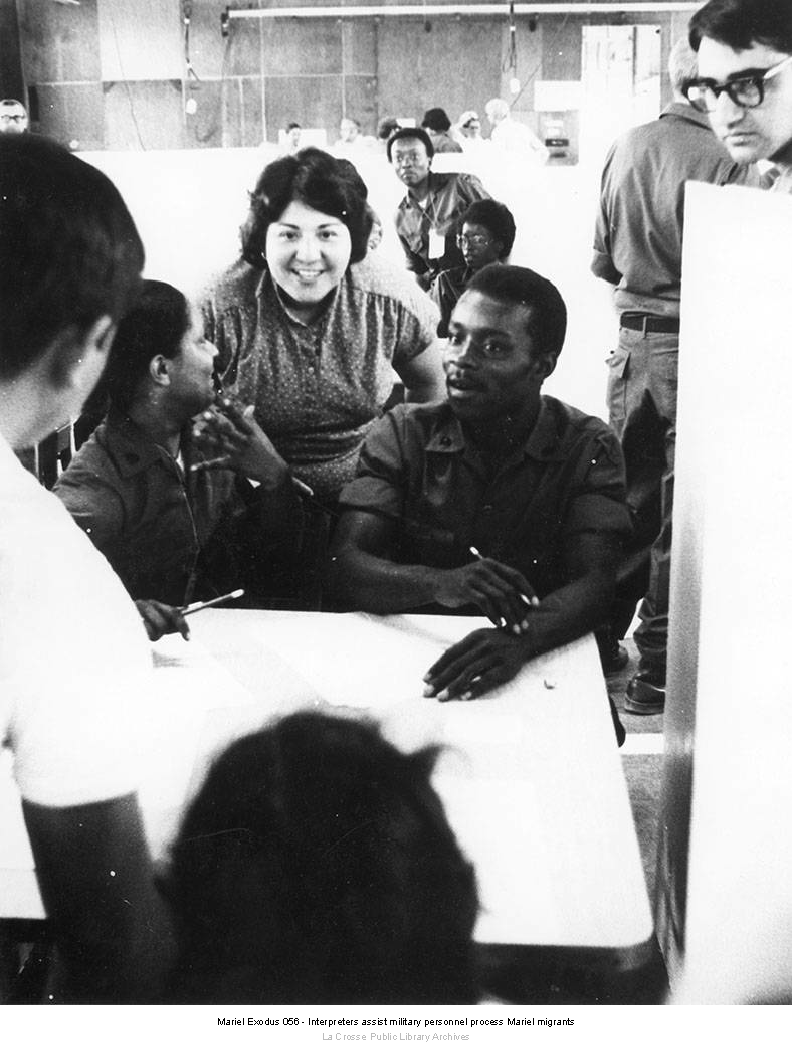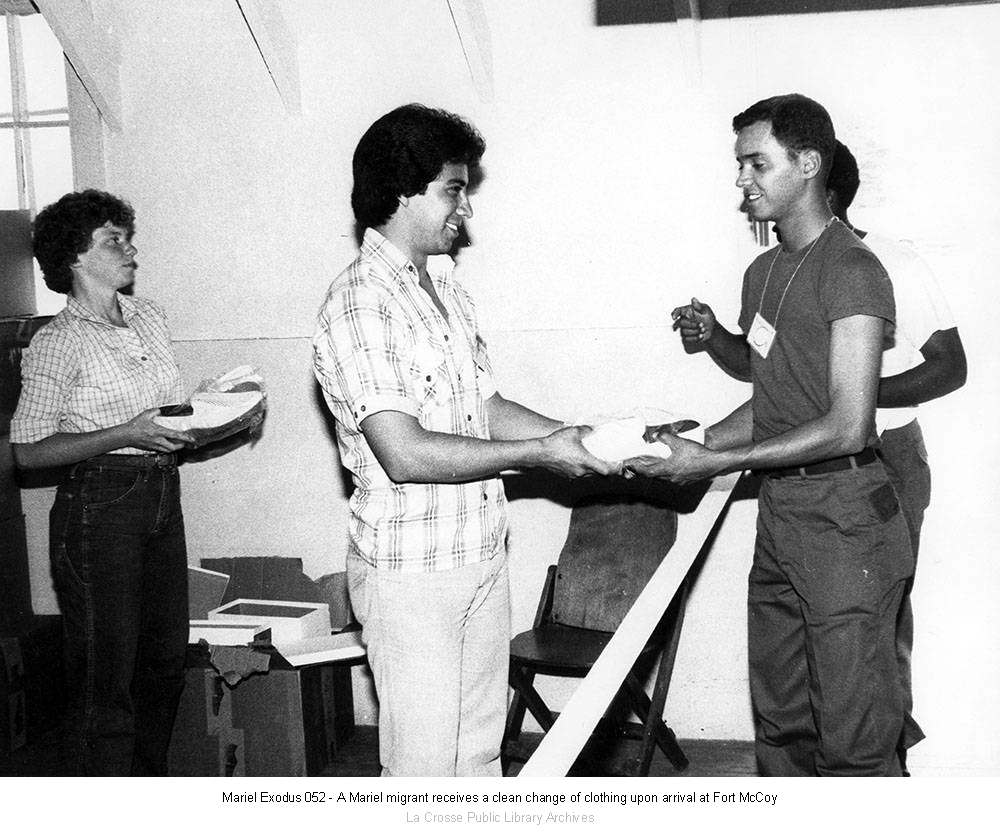
Welcoming the Cubans / Recibiendo a los cubanos
The first 172 Mariel migrants arrived in Fort McCoy on May 29, 1980. By June 23, 1980, the migrant population at the base had peaked at 13,413. Approximately 90% of that population was black and male. The majority of these men were between the ages 25-35 and had limited or no proficiency in English. At the time, there was no real provision in the law for the “entrant-status pending” label, and the federal funding for health care, education, and general welfare of the Cuban migrants came from the allocated budgets of federal, state, and local agencies. As a result, the majority of the costs of resettlement was put on the shoulders of state governments, bringing significant public resentment.
Los primeros 172 migrantes cubanos llegaron a Fort McCoy el 29 de mayo de 1980. El 23 de junio de 1980, la población de refugiados cubanos en Fort McCoy había alcanzado un máximo de 13413. Aproximadamente el 90% de esa población eran hombres negros. La mayoría tenía entre 25 y 35 años y tenían poco o ningún dominio del idioma inglés. En aquel momento, no había ninguna disposición en la ley para la categorización de “entrante con estatus pendiente” y la financiación federal para la atención médica, la educación y el bienestar general de los migrantes cubanos provenía de los presupuestos asignados a las agencias federales, estatales y locales. Como resultado, la mayoría de los costos de recibir a los refugiados cubanos recaía en los gobiernos estatales, lo que provocó un notable resentimiento público.
At the camps, Mariel “entrants” were assigned an alien number and a camp ID card, and were asked to choose a voluntary agency (VOLAGS) from a list to help them find a sponsor. These were organizations of which Cubans had very limited information which made their selection very arbitrary. A lengthy immigration screening process required Cubans to file a formal request to reside in the U.S. and clearances for domestic U.S. security were required, involving officials from the INS, the FBI, the CIA, and the State Department. A medical clearance from the Public Health Service (PHS) stationed at the compounds was also required, which involved waiting for the results of blood testing and x-rays for respiratory and contagious diseases.
En los campamentos, a los “entrantes” del Mariel se les asignaba un número de extranjero y una tarjeta de identificación del campamento, y se les pedía que eligieran una agencia voluntaria (VOLAGS, por sus siglas en inglés) de una lista para que los ayudara a encontrar un patrocinador. Estas eran organizaciones de las que los cubanos tenían muy poca información, lo que hacía que su selección de una VOLAG fuera muy arbitraria. Luego, un largo proceso de selección de inmigración requería que los cubanos presentaran una solicitud formal para residir en los EE. UU. y se exigían autorizaciones para la seguridad interna de los EE. UU., en las que participaban funcionarios del INS, el FBI, la CIA y el Departamento de Estado. También se exigía una autorización médica del Servicio de Salud Pública (PHS, por sus siglas en ingles) estacionado en los complejos, lo que implicaba esperar los resultados de análisis de sangre y radiografías para detectar enfermedades respiratorias y contagiosas.
These steps were further complicated by the refusal of the Cuban government to provide any records for the migrants and the language barrier. In Wisconsin, migrants' intake was assisted by interpreters who were mostly area college and high school students with rudimentary Spanish and were not required to pass language proficiency exams. This often caused costly errors in the misspelling of names and other personal history and lamentable confusion in the categorization of the Mariel migrants.
Estos pasos se complicaban aún más por la negativa del gobierno cubano de proporcionar ningún tipo de datos sobre los migrantes, y por las barreras del lenguaje. En Wisconsin, la admisión de los migrantes contaba con la ayuda de intérpretes que, en su mayoría, eran estudiantes universitarios y de secundaria de la zona con un español rudimentario y no estaban obligados a aprobar exámenes de competencia lingüística. Esto a menudo causaba costosos errores en la ortografía de los nombres, datos personales, y graves confusiones en la categorización de los migrantes cubanos.
Mariel migrants needed to secure sponsors who would agree to help the migrants resettle in the community. The VOLAGS that Cubans had chosen would try to contact any existing relatives in the U.S., or find American sponsors in Wisconsin. While most Mariel Cubans who arrived in Florida during the first two weeks of the Mariel exodus either had relatives waiting for them or benefited directly from the work of South Florida VOLAGS to resettled quickly in the Miami area, the Cubans who were sent to Arkansas, Pennsylvania and Wisconsin had very different fortune. Many had ventured out of Cuba unexpectedly, or had been forced or misled by the Cuban government to join in the boatlift. They had no relatives and depended strictly on finding an American sponsor.
Los migrantes de Mariel necesitaban conseguir patrocinadores que estuvieran dispuestos a ayudarlos a establecerse en la comunidad. Los VOLAGS que los cubanos habían elegido tratarían de ponerles en contacto con cualquier familiar que tuvieran en Estados Unidos, o de encontrar patrocinadores estadounidenses en Wisconsin. Mientras que la mayoría de los cubanos de Mariel que llegaron a Florida durante las dos primeras semanas del éxodo ya tenían familiares esperándolos, o se beneficiaron directamente del trabajo de los VOLAGS del sur de Florida para asentarse rápidamente en la zona de Miami, los cubanos que fueron enviados a Arkansas, Pensilvania y Wisconsin tuvieron una suerte muy diferente. Muchos se habían aventurado a salir de Cuba inesperadamente o habían sido obligados o engañados por el gobierno cubano para unirse al éxodo marítimo. No tenían parientes en Estados Unidos y dependían estrictamente de encontrar un patrocinador estadounidense.
Inside Fort McCoy, Cubans depended mostly on the personal relationships they could develop with American camp personal to find sponsors. Many Cubans went to live temporarily with soldiers or camp volunteers or interpreters who decided to sponsor the migrants. Farmers and other small business owners in the Sparta and La Crosse area also sponsored Cubans to work for them and, in some cases, paid them exploitative wages which prompted the Cubans to break the sponsorship and continue on their own. Cubans also often convinced their American hosts to sponsor more Cubans out of the base, even if they knew that those still at Fort McCoy planned to go directly to bigger cities with larger Spanish-speaking communities such as Miami or New York.
Dentro de Fort McCoy, los cubanos dependían principalmente de las relaciones personales que podían desarrollar con el personal estadounidense del campamento para encontrar patrocinadores. Muchos cubanos fueron a vivir temporalmente con soldados, voluntarios del campamento, o intérpretes que decidieron patrocinarlos. Algunos agricultores y otros propietarios de pequeñas empresas en el área de Sparta y La Crosse también patrocinaron a cubanos para que trabajaran para ellos y, en algunos casos, les pagaron salarios abusivos que llevaron a los refugiados a romper el patrocinio. A menudo, los cubanos también convencían a sus anfitriones estadounidenses para que patrocinaran a más cubanos fuera de la base, incluso si sabían que los que aún estaban en Fort McCoy planeaban ir directamente a ciudades con mayores poblaciones de hispanoparlantes, como Miami o New York.
By the closing of the camp at Fort McCoy on November 3, 1980, 3,236 unplaced refugees were transferred to Fort Chafee, in Arkansas, a camp that remained open until February of 1982. 60 refugees who were considered mental patients by FEMA doctors were sent to health facilities in Massachusetts. 84 juveniles were moved to cabins in Wyalusing State Park, in Prairie du Chien.
Al cierre del campamento en Fort McCoy, el 3 de noviembre de 1980, 3236 refugiados sin ubicación fueron trasladados a Fort Chafee, en Arkansas, un campamento que permaneció abierto hasta febrero de 1982. 60 refugiados que fueron considerados pacientes mentales por médicos de FEMA se enviaron a instalaciones de salud mental en Massachusetts. 84 menores fueron trasladados a cabañas en el parque estatal de Wyalusing, en Prairie du Chien.
Last Updated Date
The La Crosse Public Library welcomes patron participation and comments on the La Crosse Public Library’s social media and in our online forums. All LPL online sites are governed by general rules of respectful civil discourse. Individual patrons are fully responsible for everything that they post.
The La Crosse Public Library does not discriminate against any views. However, we reserve the right to remove content that violates the below rules, without consent. We do not verify the identity of participants.
- The Library will remove:
- Off topic contributions
- Content that contains obscenity, nudity, defamation or hate speech (Speech that targets people or groups based on race, ethnicity, religion, gender, or any other protected status).
- Content that threatens to harm individuals, groups, or organizations
- Spam and content that promotes services or products, or that involves political campaigning or lobbying.
- Comments that give the appearance of legal, medical or financial advice.
- The Library may remove
- Content that contains personal information (whether your own or someone else's), including home address, home or cell phone number, or personal e-mail address, in order to protect privacy.
- Gratuitous links to sites.
- Repeat submissions of the same (or very similar) contributions will be viewed as spam and may result in the content being removed.
- The Library will only post content from participants over 13 years of age.
- Communications made through social media posts, e-mail, webinars, and messaging systems will in no way constitute a legal or official notice or comment to the La Crosse Public Library or any official or employee of the Library for any purpose.
- All user-generated content is released into the public domain unless the participant clearly states otherwise,
- Users who do not comply with these standards of conduct may be blocked.
Disclaimer for links posted on our Website or Social Media
External links are being provided as a convenience and for informational purposes only; they do not constitute an endorsement or an approval by the La Crosse Public Library of any of the products, services or opinions of the corporation or organization or individual. The La Crosse Public Library bears no responsibility for the accuracy, legality or content of the external site or for that of subsequent links. Contact the external site for answers to questions regarding its content.
Reviewed and approved by Library Board, November 2021
